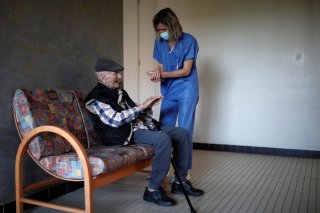Coronavirus: Why We Need to Keep Protecting People Over 70
Studies from several different countries show that the large majority of people dying of COVID-19 are over 70 years of age.
As lockdowns ease and more people begin to leave their homes on a regular basis, there’s still one group that is often singled out as needing to remain isolated: people over the age of 70.
Many people who are in that age bracket but who are otherwise healthy might feel cooped up by ongoing instructions to stay indoors, and the policy of shielding elders has been criticised by some epidemiologists as being too harsh.
But the wealth of data we have on COVID-19 clearly shows that older people are at significantly increased risk of the disease, whether they are in care homes or living in private homes. And until we can tailor medicine to combat the effect of ageing on our immune systems, it makes sense to protect the over-70s as much as we can.
A grim toll
Studies from several different countries show that the large majority of people dying of COVID-19 are over 70 years of age.
According to data from Office of National Statistics, 83% of COVID-19 deaths in England and Wales are among over-70s. Other countries show similar trends, in spite of very different coronavirus strategies.
Norway chose a strict lockdown and has a very low death toll, 44 deaths per million inhabitants. South Korea is using an aggressive track and trace approach and has even less deaths, just five deaths per million. Sweden has a more relaxed no-lockdown strategy and 461 deaths per million, compared to 597 deaths per million in the UK.
Regardless of the strategy, the proportion of over-70s deaths remains very similar, and age is by far the main risk factor for the disease.
This is also true for deaths in care homes. A recent study has looked more carefully at deaths among care home residents in different countries, showing a clear trend. In countries with more than 100 deaths, care homes account for 24-82% of people who die from COVID-19. This is part of why we have to continue shielding the elderly even after lockdown lifts.
But why does age increase the risk for COVID-19?
How COVID-19 affects the over-70s
There are several reasons why age is a major risk factor. One is age-related changes to the immune system. As we get older, our immune system undergoes changes resulting in a less robust immune response, incomplete clearance of infections and decreased ability to protect against infections.
But vulnerability to COVID-19 is more complicated than just reduced immunity. Young children who also do not have fully functional immune systems, and are prone to illnesses such as influenza, are at very low risk of severe COVID-19. There must be something about ageing itself that spurs vulnerability to the disease.
Ageing not only involves reduced immunity, but also chronic inflammation, which occurs when parts the immune system become overactive. Chronic inflammation is common in patients with underlying conditions such as obesity, hypertension and diabetes which also increase the risk of severe COVID-19. One possibility is that these diseases contribute to severe COVID-19 outcomes through the same mechanisms as ageing.
Not everybody ages the same
Over the past 30 years, huge progress has been made in our understanding of ageing. We now know the biological mechanisms that drive ageing, involving genomic damage, dysregulation of proteins and changes in metabolism.
We are learning how we can target these processes to slow down age-related decline through diet and exercise, but also through pharmaceutical drugs that protect us as we age. One example is metformin, a widely used drug to treat diabetes, which is undergoing clinical trials for its anti-ageing effects.
We have also learned that age-related decline varies between different people. Chronological age, the number of years since birth, is not always the same as biological age, which is the measurement of biological age-related decline.
This may be of use in future pandemics. By measuring biological age, we can identify high-risk individuals. Scientists are working out biomarkers from blood samples that can predict an individuals’ biological age, so called “age clocks”. In the not-too-distant future, we will be these clocks to slow down age-related decline and improve resilience to diseases.
Minimising exposure
The COVID-19 pandemic brutally exposes the medical, social and economic vulnerability of ageing societies. Bitter lessons have been learned about the importance of protecting the over-70s against the disease.
The continued fight against the virus will involve preventing exposure of the most vulnerable, but also working long-term so that older people have better biological protection in the future.
For now, the data is clear. Over-70s run a much higher risk for severe COVID-19. As the virus is still spreading through communities, and given that we might experience a second wave or local flare-ups, the over-70s must continue to take the greatest care to minimise their exposure and risk.
Sticking to strict social distancing, limiting the number of contacts and avoiding busy places such as public transport and shops is essential.
![]()
Marina Ezcurra, Lecturer in the Biology of Ageing, University of Kent
This article is republished from The Conversation under a Creative Commons license. Read the original article.
Image: Reuters

